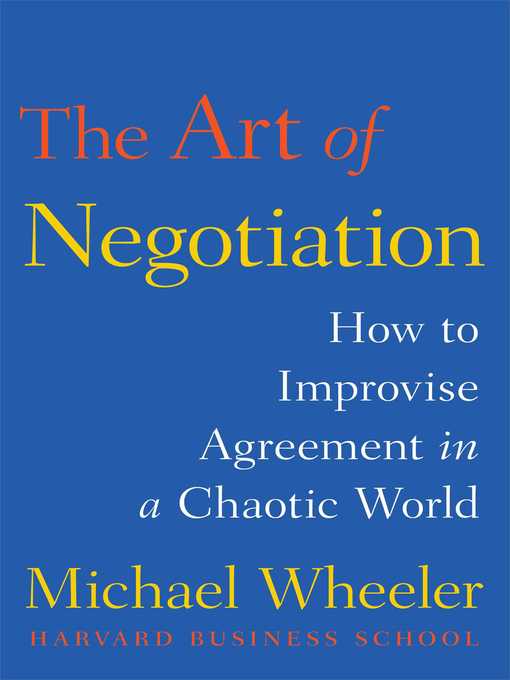
The Art of Negotiation
How to Improvise Agreement in a Chaotic World
کتاب های مرتبط
- اطلاعات
- نقد و بررسی
- دیدگاه کاربران
نقد و بررسی

August 12, 2013
Harvard Business School professor Wheeler, a member of the school’s Negotiation, Markets & Organizations unit, offers a clear-headed, creative approach to negotiation that is on a par with the canonical texts, Getting to Yes and You Can Negotiate Anything. Those titles suggest abandoning hardball tactics and turning every interaction into a negotiation. Wheeler, on the other hand, posits that the most important aspect of negotiation is improvisation and constant flexibility, acknowledging that each party goes into a negotiation without truly understanding the other person’s position. Often, each party’s real needs don’t emerge until the negotiations are in progress. Wheeler discusses strategies for managing uncertainty and understanding the true extent to which preferences, needs, and relationships are constantly changing. He steers readers toward making wise decisions about whether or not to pursue a negotiation in the first place, conducting sufficient research, keeping their cool, and closing the deal. Wheeler’s lucid, engaging voice is a major asset, and sample scripts help drive home his points. Agent: Jim Levine, Levine Greenberg Literary Agency.

August 15, 2013
Wheeler (Harvard Business School/Negotiation, 2003, etc.) distills his teaching experience and research in expanding methods of negotiation. The author writes that many negotiation tactics fail to "capture the complexity of real-world negotiation." Old-fashioned hardball methods were undermined by the emphasis on first identifying and then building on mutual interests of those involved. Wheeler offers a dynamic approach that assumes interests will be identified and developed during negotiations, and he stresses that effective negotiations are based on the ability to extemporize and to master a flexible approach, permitting uncertainty to be managed effectively. "We can't script the process," he writes. "Whoever sits across the table from us may be just as smart, determined, and fallible as we are." Wheeler begins with a three-part cycle based on the capacity to learn, adapt and influence, and he brings these abstractions to life by discussing classroom experiences designed to address the effectiveness of different ways of dealing with problems, using role-playing and other kinds of simulations and enactments. Wheeler also provides case studies from real estate transactions and other business ventures. He discusses how Don Schnabel acquired and assembled separate parcel lots into the most expensive lot in New York history, which became Citibank's headquarters; and how Jerry Weintraub inveigled the movie stars who participated in the Oceans Eleven remake with him into a sequel by "stretching the truth." Wheeler advocates planning, envisioning pathways to the endgame, and using both carrots and sticks, among other approaches. He also provides many examples and helpful stratagems for dealing with slights and belittlement, and he examines nonverbal and emotional behaviors. Throughout, he advocates looking below the surface for closure opportunities. For him, the OODA loop--observe, orient, decide, act--supplements learning, adapting and influencing. A fresh approach offering new ways to improve negotiating skills.
COPYRIGHT(2013) Kirkus Reviews, ALL RIGHTS RESERVED.

September 15, 2013
Apart from books that instruct on win-win negotiation techniques and strategies to control negotiations, this book focuses on how to deal with and capitalize on the dynamic nature of negotiations. It shows how opportunities are missed when people are inflexible in their approaches and how roadblocks can be overcome with spontaneity and creative ideas. It points out situations in which the commonly known BATNA (Best alternative to a negotiated agreement) model is not always the best strategy. Wheeler advocates that effective negotiation demands rapid cycles of learning, adapting, and influencing to manage the uncertainty of a negotiation. Wheeler likens this to improv and countering surprises with flexibility. Real-life examples, including the development of the Citibank center in New York, illustrate how applying nine key principles can improve success in a negotiation. Other topics discussed include situational awareness, military techniques, and balancing risk and reward in determining when and how to say yes to a deal. The appendix provides a handy summary of the key points for future reference, and the book is a good basic guide to making the best of a negotiation.(Reprinted with permission of Booklist, copyright 2013, American Library Association.)

























دیدگاه کاربران